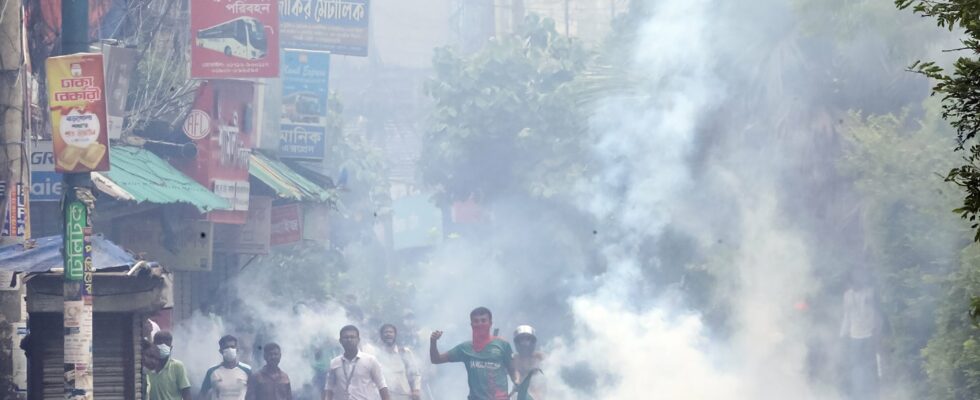Bangladeshi Prime Minister Sheikh Hasina left her palace in Dhaka on Monday, August 5, according to a source close to the leader, before thousands of anti-government protesters stormed it, according to television footage. According to the country’s army chief, the head of the Bangladeshi government has also resigned. He said he would “form an interim government” in a televised speech. The general had already said in a statement on Saturday that the military would “always stand with the people.”
Sheikh Hasina’s palace in the capital Dhaka was stormed by thousands of protesters on Monday, television footage showed, after a source told AFP the leader had fled to a “safer location”. She left the city by helicopter, according to a source close to the 76-year-old leader. “She wanted to record a speech. But she couldn’t get the chance to do it,” the source close to the leader said.
400,000 protesters
Sheikh Hasina’s son Sajeeb Wazed had earlier urged security forces to prevent any takeover. “Your duty is to ensure the security of our people and our country and uphold the Constitution,” he wrote on Facebook.
The eldest daughter of Sheikh Mujibur Rahman, the founding father of Bangladesh which gained independence from Pakistan in 1971, Sheikh Hasina has been in power since 2009, after a first term between 1996 and 2001. This Monday, hundreds of thousands of anti-government demonstrators marched in the streets of the capital the day after a bloody day during which clashes left at least 94 dead across the country.
According to witnesses, large crowds are marching in the streets of Dhaka and have broken down roadblocks. The daily Business Standard estimates that some 400,000 protesters are demonstrating on Monday, a number that AFP has not been able to verify. At least 300 people have been killed since the protests began in July, according to an AFP tally based on data from police, officials and hospital sources.
A curfew went into effect in the country Sunday night. All 3,500 factories have closed in Bangladesh, where the garment industry has been the main driver of impressive economic growth. Internet access was cut off across the board on Monday, according to suppliers and watchdogs.
“Battlefield”
This Sunday, new clashes between opponents of Mrs Hasina, security forces and supporters of the ruling party left at least 94 dead throughout the country. This is the heaviest toll in a single day since the start of anti-government demonstrations a month ago in this Muslim country of 170 million inhabitants where students are protesting, against a backdrop of acute unemployment among graduates, the favors that those close to the government receive to become civil servants.
Among the dead were at least 14 police officers, according to police spokesman Kamrul Ahsan. A police station in Enayetpour, in the northeast of the country, was stormed and 11 officers killed, police said. All of Dhaka was transformed “into a battlefield” and a crowd of several thousand demonstrators set fire to cars and motorcycles near a hospital, according to another police source. “The shocking violence in Bangladesh must stop,” urged the UN High Commissioner for Human Rights, Volker Turk, on Sunday evening.
Call for withdrawal of troops
The clashes are among the deadliest since Sheikh Hasina came to power 15 years ago. Her government has shut down schools and universities and deployed the army to restore order.
But former military officers have since come out in support of the protesters. In a highly symbolic stand against the prime minister, a former army chief, General Ikbal Karim Bhuiyan, and several other former senior officers called for the withdrawal of troops from the streets, stressing that people were “no longer afraid to sacrifice their lives”. In several cases, soldiers and police have not intervened against the protesters, unlike last month. “Those who are responsible for pushing the people of this country into such dire poverty must be brought to justice,” General Bhuiyan also said.
“Live freely”
The country has many unemployed graduates, and students are demanding the abolition of a system of positive discrimination that reserves a quota of public jobs for the families of independence veterans. Partially abolished in 2018, this system was restored in June by the courts, setting off a powder keg, before a new reversal at the end of July by the Supreme Court.
The social crisis turned into a political crisis from July 16, when the repression claimed its first lives, with protesters demanding Sheikh Hasina’s resignation. “It’s not just about job quotas anymore,” Sakhawat, a young protester we met in Dhaka, told AFP. “We want future generations to be able to live freely,” she said.
